What is Instagram?

Instagram is a social media platform and photo-sharing app that allows users to share photos, videos, and stories with people around the world. It is a great way to stay connected with friends, family, and the world. Instagram also allows users to edit and filter their photos and videos, as well as add captions, stickers, and hashtags. With its vast array of tools, users can create unique and creative content that expresses their individual style and personality.
RELATED: Sebastian Maniscalco Sister Jessica 5 Facts To Know
What are the Pros of using Instagram?
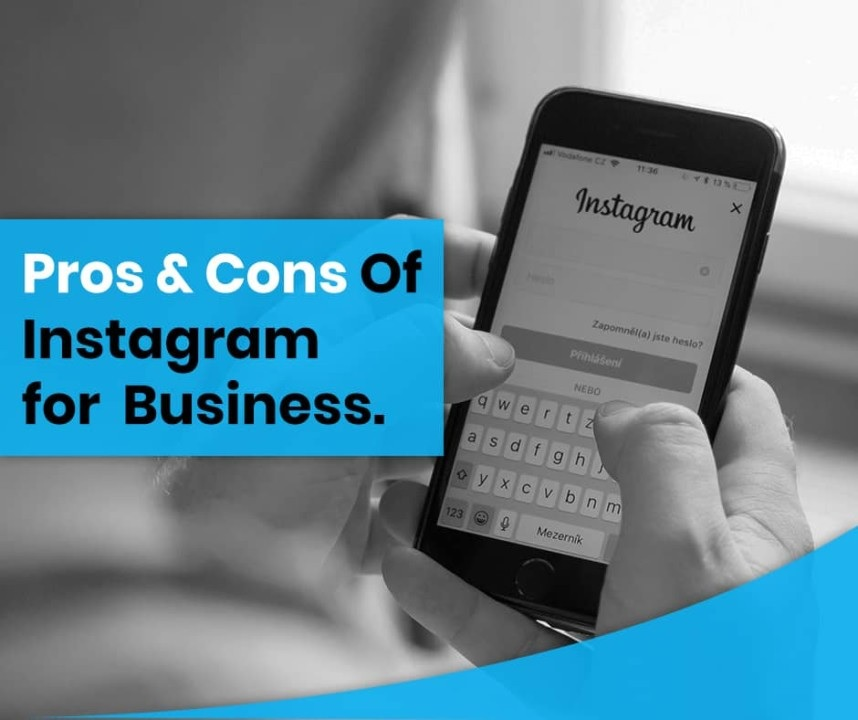
1. Instagram is a powerful virtual entertainment stage that permits clients to rapidly and effectively share photographs and recordings with a wide audience.
2. It has an enormous client base, and that implies that clients can undoubtedly interface with possible clients or similar people.
3. The stage likewise gives an extraordinary method for building brand mindfulness and unwaveringness, as clients can share their encounters and draw in with the brand.
4. Instagram additionally provides amazing assets to assist organizations with reaching their interest group, for example, hashtags, area labels, and supported posts.
5. It is an extraordinary stage for visual narration, which can be utilized to showcase items, administrations, and advancements.
6. Instagram likewise takes into consideration direct information, which gives organizations a potential chance to connect with their clients and build connections.
7. Furthermore, the stage has an assortment of examination devices that can be utilized to follow the presentation of posts and measure the outcome of missions.
8. Instagram is likewise an incredible stage for powerhouse promoting, as it makes it simple to find and interface with forces to be reckoned with who can possibly contact a wide crowd.
9. At last, Instagram is an extraordinary way for organizations to exhibit their imagination and draw in with clients in a tomfoolery and intuitive way.
What are the Cons of Instagram?
1. Reduced Productivity - Since Instagram is a social media platform, using it for too long can lead to a decrease in productivity for both individuals and businesses.
2. Fake Accounts - Instagram is filled with fake accounts created by people to deceive users, promote spam, and spread malicious links.
3. Privacy Issues - Instagram collects personal information from its users and can share it with third-party applications or companies.
4. Cyberbullying and Harassment - Instagram can be a platform for cyberbullying and other forms of harassment.
5. Addiction - Instagram can be addictive, leading to an unhealthy obsession with the platform and neglecting other aspects of life.
Why Instagram scams are increasing everyday?
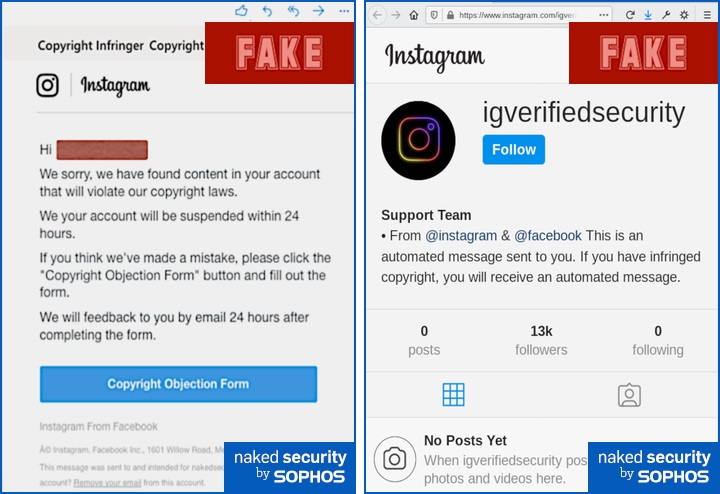
Instagram scams are expanding regularly because of the site's prominence and enormous client base. Con artists are exploiting the fact that many individuals don't know about the dangers associated with utilizing the stage. Moreover, con artists can utilize different strategies to target clients, like phony records, phishing tricks, and malevolent connections. At long last, con artists can utilize social design strategies, for example, mimicking famous records and utilizing misleading vows to fool clients into giving them access to individual data or cash.
How can you avoid yourself from Instagram scammers?
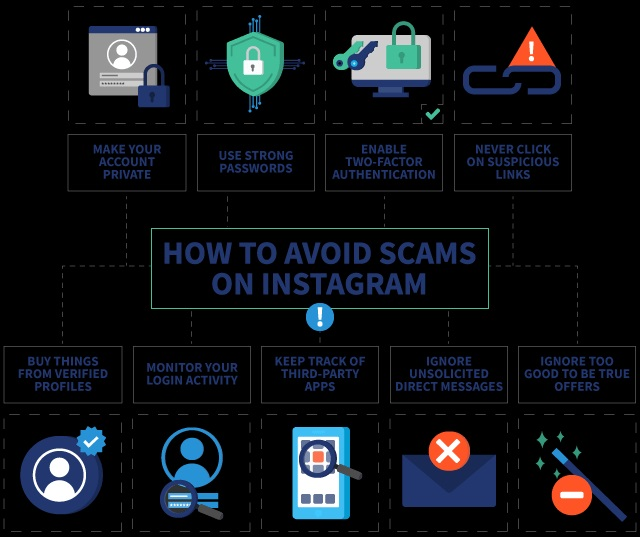
2. Research the account before engaging with it. Check for red flags such as a recent account creation, a low follower count, or suspicious posts.
3. Verify: Verify that the account is legitimate by looking for verification symbols, such as a blue checkmark.
4. Report: Report suspicious activity to Instagram by using the "Report" feature.
5. Block the account if necessary.
6. Disengage: Do not engage with suspicious accounts, even if they appear to be legitimate.
How to know about the other side of the Instagram accounts is the Scammers?

Unfortunately, there is no surefire way of knowing if someone is an Instagram scammer. However, there are some signs that can indicate that someone may be a scammer. These include asking for your personal information, asking for money or gifts, making promises that sound too good to be true, or sending links to suspicious websites. If you're ever unsure if someone's intentions are legitimate, it's best to be cautious and avoid interacting with them.
RELATED: 10 Awesome Websites Made with WordPress | 10Web Seo Ranked
Description about Instagram account?
Instagram accounts are accounts on the photo-sharing social networking service owned by Facebook, Inc. They are used to share photos and videos for public viewing. Instagram accounts can be used for personal, business, or promotional purposes.
For personal use, Instagram accounts can be used to share photos and videos with friends and family. Users can follow other users and like or comment on their posts. This can help build relationships and create an online presence.
For business use, Instagram accounts can be used to promote products and services. Businesses can use the platform to share content and interact with customers. This can help build brand awareness and create new leads.
For promotional use, Instagram accounts can be used to post sponsored content and influencer marketing campaigns. Users can collaborate with influencers to reach a larger audience and promote their brand.
Overall, Instagram accounts are a great way to share content, build relationships, and promote products. They can be used for personal, business, or promotional purposes, depending on the user's needs.
what could be the worse things about the Instagram scammars?

1. They might attempt to fool you into surrendering individual data, for example, passwords, Mastercard numbers, or financial balance subtleties.
2. They might attempt to inspire you to tap on noxious connections or download malware.
3. They might attempt to sell you fake labor and products.
4. They might attempt to utilize your record to send spam messages to your contacts.
5. They might attempt to blackmail cash from you by taking steps to uncover individual data or photographs.
Here are some common types of Instagram scams.
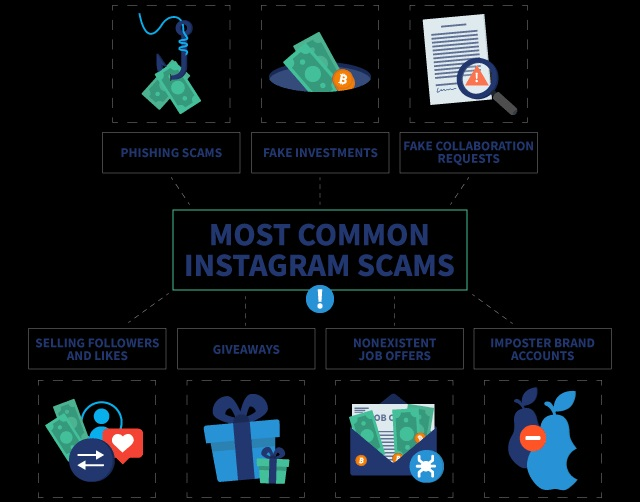
Fake giveaways: scammers claim they are giving away expensive items or money in exchange for a small fee or following their account.
Phishing: scammers create fake log-in pages or send links in messages that appear to be from Instagram, but are actually malicious websites designed to steal personal information.
Malware: scammers use malware to gain access to and control user accounts.
Fake accounts: scammers create fake accounts in order to gain access to private information or scam users out of money.
Fake followers and likes: scammers sell fake followers and likes in order to give the illusion of popularity.
Warning Signs of an Instagram Scams
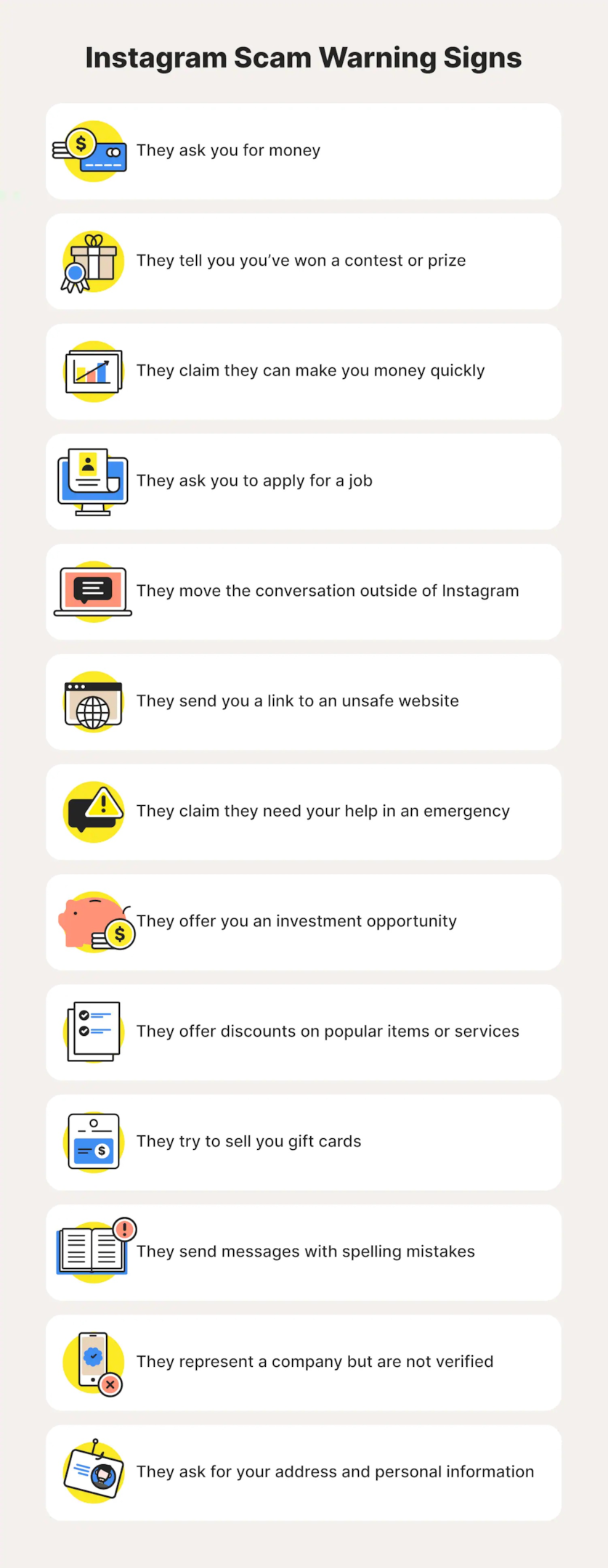
- Unsolicited messages from people you don’t know
- Offers that seem too good to be true
- Requests for personal information
- Requests for money upfront
- Promises of large sums of money
- Links to suspicious websites
- Requests to pay via money transfer services
- Pressure to act immediately
- Grammatical and spelling errors in messages
Tips for staying safe on Instagram.
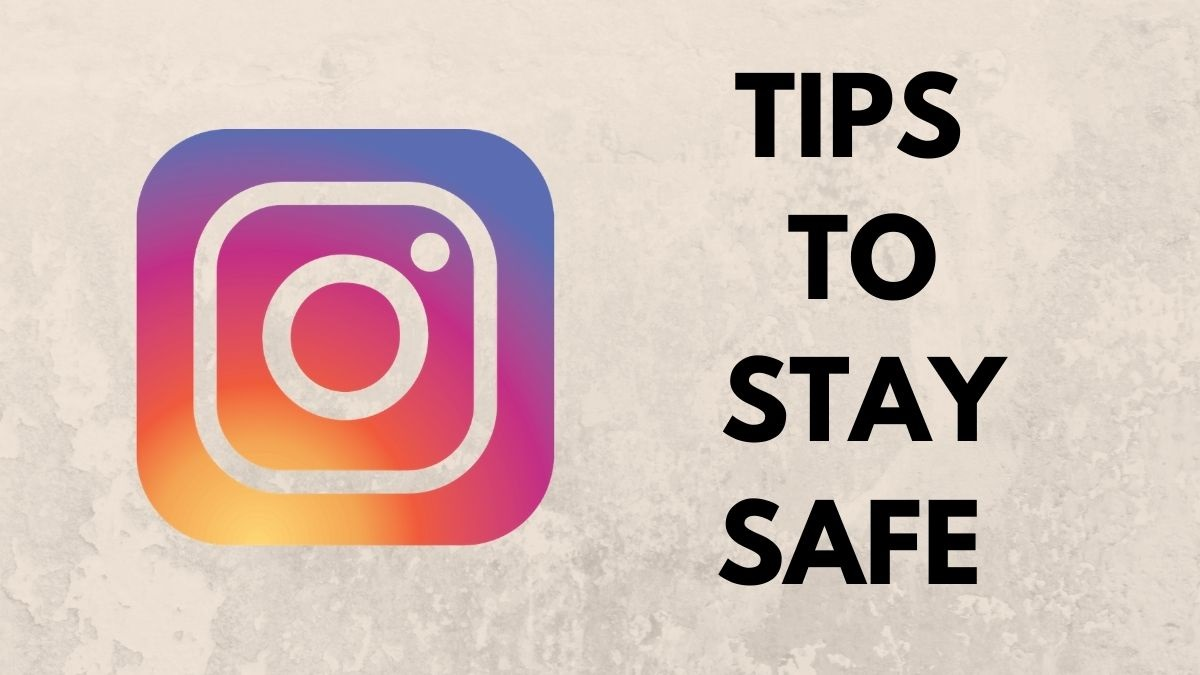
- Follow hashtags and accounts you trust
- Don’t share personal information
- Avoid clicking on suspicious links or ads
- Report inappropriate content
- Don’t follow accounts you don’t know
- Use the two-factor authentication feature
- Don’t accept friend requests from people you don’t know
- Don’t leave comments that could be taken the wrong way
- Keep your profile private and don’t share your location
What to Do if You've Been Scammed on Instagram ?
Report the scammer: If you have been scammed on Instagram, you should report the scammer to the platform. This will help Instagram take action against the scammer and prevent them from scamming other users.
Contact the relevant authorities: If you have lost money due to the scam, you should contact the relevant authorities such as the police or your bank.
Reach out to Instagram: You can contact Instagram directly to report the scam and ask for help.
Share your story: Sharing your story of being scammed on Instagram can help others avoid similar scams. Sharing your story on social media can also help raise awareness of the issue.
Take precautions: Finally, take extra precautions to protect yourself from becoming a victim of a scam on Instagram. Be wary of any messages or offers that seem too good to be true. Do your research and double-check any requests for money or other forms of payment.
How to Report an Instagram Scam?
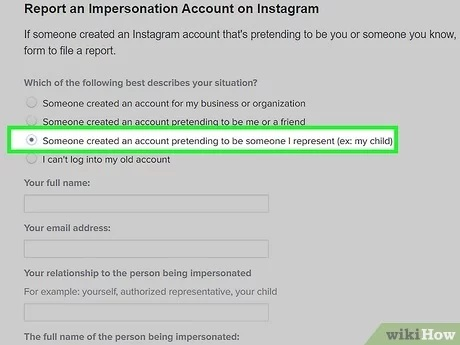
If you've been the victim of an Instagram scam, it's important to take the necessary steps to protect yourself and prevent further fraud. Reporting a scam on Instagram can help protect other users from falling victim to the same fraud. Here's how to report an Instagram scam:
1. Take screenshots of the scam. Screenshots provide evidence of the scam you encountered. This helps Instagram investigate the incident and take appropriate action.
2. Block the scammer’s account. Blocking the scammer’s account prevents any further contact with them.
3. Report the scam. Instagram has a reporting feature that allows you to flag suspicious activity. To report a scam, go to the profile of the person who scammed you and click on the three-dot menu. Select "Report" and follow the instructions provided.
4. Contact Instagram directly. If you don't feel comfortable reporting the scam through the app, you can contact Instagram directly. You can find contact details on the Instagram help page.
5. Contact your financial institution. If you gave the scammer your financial information, such as your credit card or bank account details, contact your financial institution immediately. They will be able to help protect your finances.
6. File a complaint with the FTC. You can also file a complaint with the Federal Trade Commission (FTC). The FTC is the nation’s primary consumer protection agency and can help you take action against scammers.
By following these steps, you can help protect yourself and others from falling victim to scams on Instagram.
Examples of Recent Instagram Scams

1. Fake giveaways: scammers use fake accounts to post giveaways, claiming that users can win prizes if they follow certain instructions. In reality, these instructions usually require users to submit their personal information or pay a fee.
2. Fake promotions: scammers create fake accounts claiming to represent a well-known brand or celebrity. They will then post promotions or offers that promise free products or discounts if users follow a link or provide their personal information.
3. Bogus job offers: scammers post fake job offers, claiming that users can make quick money by working from home or by taking part in a survey. In reality, these offers are just phishing attempts, designed to collect users’ personal information.
4. Fake accounts: scammers create fake accounts that appear to be real people, usually with attractive photos or videos. They will then send messages or comments to users, asking them to follow a link or provide their personal information.
How to Avoid Clickbait Scams on Instagram
1. Don’t click on unfamiliar links or posts. Before clicking on any link or post, double check to make sure that it is from a trusted source. If it looks suspicious or the link is from a strange website, don’t click on it.
2. Don’t provide personal information or payment information. If a post or link is asking for you to provide personal information or payment information, it’s likely a scam. Don’t provide any information or send any money.
3. Be aware of flashy headlines and images. Clickbait posts often use flashy headlines and images to attract attention. Be wary of posts that promise something too good to be true or have a headline that is too outrageous.
4. Do your research. If you’re not sure if a post or link is legit, do a quick search online to see if anyone else has reported it as a scam. This can help you determine if a post is legitimate or not.
5. Report suspicious activity. If you come across a post or link that looks suspicious, report it to Instagram. This can help them take action against fraudulent accounts and posts.
Please avoid the tags written below:
instagram account instagram account instagram account instagram account instagram account instagram account instagram users instagram users instagram users instagram users

0 Comments